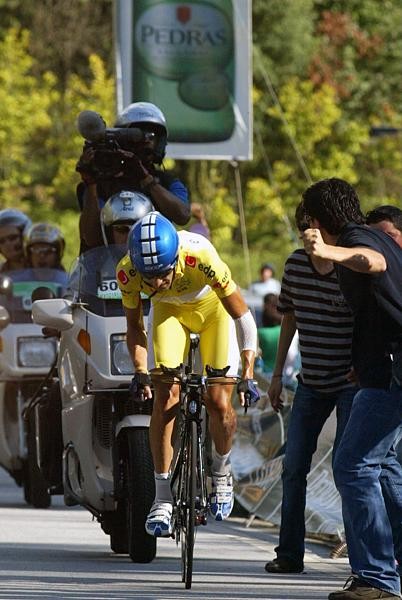Hell of the south
The Volta a Portugal may be one of Europe's oldest stage races, but with eight of this year's...

The Volta a Portugal may be one of Europe's oldest stage races, but with eight of this year's starting line-up linked to Operación Puerto, its recent reputation has been murky. Procycling's Daniel Friebe reports on Portuguese cycling's fight to clean up its act.
Take a Tube train anywhere in London this summer and, at some point on your journey, you're almost bound to see a vast white and blue poster advertising Portugal as a tourist destination. The concept, to be honest, isn't the most captivating or original: one version features a giant portrait of the former Chelsea football manager and de facto Portuguese ambassador José Mourinho above a contrived-sounding quote about the country's wine; another uses the same format, only this time it's Manchester United star Cristiano Ronaldo raving about Portuguese golf courses; fado singer Mariza pouts from another. And so on and so on.
It's fair to say that a similar campaign based on Portuguese cycling would make less flattering, though perhaps more interesting, reading. You wouldn't even have to make up the quotes. In the place of Mourinho, you could, for instance, go with ex-pro Carlos Da Cruz and his 2007 admission – "Let's say the future of cycling isn't in Portugal" – complemented with suitably knowing smile. Or how about ditching Ronaldo for Gilberto Simoni, and the puff about greens and fairways, for the Italian's comments in 2005 about the Tour of Portugal – "Going to that race is the worst thing that a rider can do"? Or, failing that, Pat McQuaid and any of his numerous outbursts on the continental divide between northern and southern Europe and their attitude to doping?
It wasn't always like this, of course. Cycling in Portugal once thrived. The Volta a Portugal was first staged in 1927, predating the Vuelta a España by eight years. Between the 1940s and early 1980s, the race even stretched to three weeks. Even now, spanning 12 days in the middle of August, it is the fourth longest race on the European calendar behind the Vuelta, the Tour de France and the Giro d'Italia.
According to race director and three-time former winner Joaquím Gomes, three million people out of Portugal's total population of 10.6 will have seen this year's race by the time it concludes with a 31km uphill time trial to Felgueiras on the last Sunday of August. Gomes tells us this on the fourth evening of the race, in a typically well-appointed press room in Viseu, no more than a kilometre from the town's ancient cathedral. Like his race, Gomes seems to exude good health. He's now well into his forties, but his eyes sparkle and his skin glistens. Think Christian Prudhomme after three weeks in Cannes.
When Gomes tells us that "Portuguese cycling suffers from the same problem as cycling in general, in other words a strong connotation with doping", he's right, but only to a point. Because while almost no nation has been spared the devastation reaped by countless doping scandals over the past decade, few have ended that decade with quite as many stains on their reputation as Portugal. Or with quite as many tarnished riders populating their teams. It would be both a cliché and an gross exaggeration to say that the startlist of this year's Tour of Portugal resembled Doctor Eufemiano Fuentes's client list circa May 2006, but it would also be naive to suggest that thought didn't cross a few minds.
Francisco Mancebo, Santiago Pérez, Eladio Jiménez, David Blanco, Isidro Nozal, Rubén Plaza, Koldo Gil, David Bernabeu... all figured in the Operación Puerto police files, and all lined up in Portimão for the Volta's 6.4km prologue on August 13. It just so happened that one of the infamous eight – Rubén Plaza – also went on to win.
Get The Leadout Newsletter
The latest race content, interviews, features, reviews and expert buying guides, direct to your inbox!